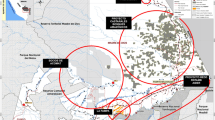Abstract
The development of cooperation depends on the nature of deliberations among and between local stakeholders and the state as well as the context of deliberations, especially whether larger scale governance helps, hinders or overrides deliberative processes. However, the context of deliberations has not been a focus of past research on deliberation. The paper identifies the key context criteria that influenced deliberation and the development of cooperation in a comparative case study of two forest advisory committees in Ontario, Canada. The study uses cognitive mapping and network analysis techniques to identify key context criteria and concludes with five inferences regarding the influence of context on deliberation and cooperation that have implications for deliberation and decentralization theories.

Similar content being viewed by others
Notes
Community informants were an independent group of interviewees identified by LCC members and District Office support staff as having a “balanced” perspective on the general relationship between the District Office and local communities.
Categories were based on a division of criteria into low, medium and high rankings. This categorization was considered optimal since parsimony was balanced with precision in terms of the final number of key context criteria identified.
References
Agrawal, A. (2002). Common resources and institutional sustainability. In Ostrom, E., Dietz, T., Dolsak, N., Stern, P. C., Stonich, S. & Weber, E. U. (eds.), The Drama of the Commons, National Academy Press, Washington, DC, pp. 41–85.
Baland, J. M., and Platteau, J. P. (1996). Halting Degradation of Natural Resources. Clarendon, Oxford.
Banxia Software Ltd. (2002). Decision Explorer Student Version 3.2.3. Cumbria, Kendal.
Barnard, C. I. (1938). The Functions of the Executive. Harvard University Press, Cambridge.
Brightman, J. R. (2003). Mapping methods for qualitative data structuring (QDS). Paper presented at the Strategies in qualitative research: methodological issues and practices using QSR NVivo and NUD*IST conference, London, UK.
Dietz, T., Ostrom, E., and Stern, P. C. (2003). The Struggle to Govern the Commons. Science, 302(5652): 1907–1912.
Eden, C., and Ackermann, F. (1998). Making Strategy the Journey of Strategic management. Sage, London.
Fielding, N. G., and Lee, R. M. (1998). Computer Analysis and Qualitative Research. Sage, London.
Gower, J. C., and Ross, G. J. S. (1990). Minimum Spanning Trees and Single Linkage Cluster Analysis. Applied Statistics 18: 56–64.
Hunt, L. M., and McFarlane, B. L. (2002). Views about forest management in Ontario: highlights from surveys with the Ontario public (No. CNFER Technical Report TR-010). Ont. Min. Natur. Resour, Thunder Bay.
Innes, J. E., and Booher, D. E. (1999). Consensus Building and Complex Adaptive Systems a Framework for Evaluating Collaborative Planning. Journal of the American Planning Association, 65(4): 412–423.
Jackson, L. S. (2001). Contemporary Public Involvement: Toward a Strategic Approach. Local Environment 6(2): 135–147.
Jentoft, S., McCay, B. J., and Wilson, D. C. (1998). Social Theory and Fisheries Co-Management. Marine Policy 22(4–5): 423–436.
Mendoza, G. A., and Prabhu, R. (2005). Combining Participatory Modeling and Multi-criteria Analysis for Community-Based Forest Management. Forest Ecology and Management 207(1–2): 145–156.
Miles, M. B., and Huberman, A. M. (1994). Qualitative Data Analysis: An Expanded Sourcebook. Sage, London.
MNR. (2002). State of the forest report, 2001: Ministry of Natural Resources.
Nicolini, D. (1999). Comparing Methods for Mapping Organizational Cognition. Organization Studies 20(5): 833–860.
Nilsson, S. (2000). Challenges for the boreal forest zone and IBFRA (No. Gen. Tech. Rep. NC-209). U.S. Department of Agriculture, Forest Service, North Central Res. Stn, St. Paul, Minnesota, USA.
Ostrom, E., and Wertime, M. B. (1998). IFRI research strategy. In Gibson, C., McKean, M. A. and Ostrom, E. (eds.), Forest Resources and Institutions, FAO, Rome, pp. 217.
QSR International Pty Ltd. (2000). QSR NUD*IST 5. Melbourne, Australia.
Robson, M., and Kant, S. (2007). The Development of Government Agency and Stakeholder Cooperation: A Comparative Study of Two Local Citizens Committees’ (LCCs) Participation in Forest Management in Ontario, Canada. Forest Policy and Economics 9(8): 1113–1133.
Robson, M., Hawley, A., and Robinson, D. (2000). Comparing the Social Values of Forest-Dependent, Provincial and National Publics for Socially Sustainable Forest Management. Forestry Chronicle 76(4): 615–622.
Ross, M. M. (1997). A History of Forest Legislation in Canada 1867–1996 (No. 2). Canadian Institute of Resources Law, Calgary.
Shindler, B., Cheek, K. A., and Stankey, G. H. (1999). Monitoring and Evaluating Citizen–Agency Interactions: A Framework Developed for Adaptive Management (No. General Technical Report PNW-GTR-452): USDA Forest Service, Pacific NW Research Station.
Singleton, S., and Taylor, M. (1992). Common Property, Collective Action and Community. Journal of Theoretical Politics 4(3): 309–324.
Smith, P. (1996). Aboriginal Participation in Forest Management: Not Just Another “Stakeholder”. [Editorial]. Forestry Chronicle 72(1): 2–5.
Statistics Canada. (2002). 2001 Community Profiles. Statistics Canada, Ottawa.
Waage, S. (2003). Collaborative Salmon Recovery Planning: Examining Decision Making and Implementation in Northeastern Oregon. Society & Natural Resources 16(4): 295–307.
Wade, R. (1988). Village Republics: Economic Conditions for Collective Action in South India. Cambridge University Press, Cambridge.
Walsh, J. P. (1995). Managerial and Organizational Cognition—Notes from a Trip Down Memory Lane. Organization Science 6(3): 280–321.
Wang, S. H. (1996). A Dynamic Perspective of Differences between Cognitive Maps. Journal of the Operational Research Society 47(4): 538–549.
Author information
Authors and Affiliations
Corresponding author
Rights and permissions
About this article
Cite this article
Robson, M., Kant, S. The Influence of Context on Deliberation and Cooperation in Community-Based Forest Management in Ontario, Canada. Hum Ecol 37, 547–558 (2009). https://doi.org/10.1007/s10745-009-9251-4
Published:
Issue Date:
DOI: https://doi.org/10.1007/s10745-009-9251-4




